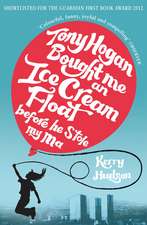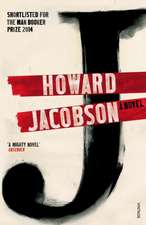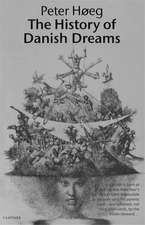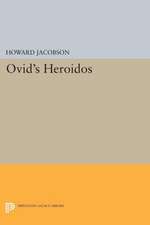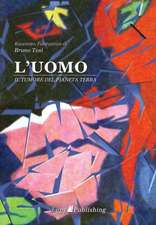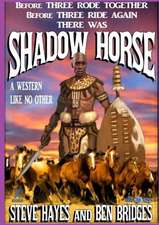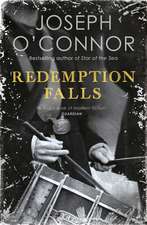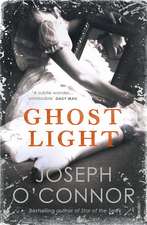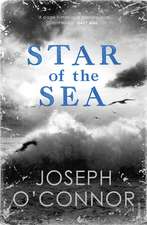Who's Sorry Now
Autor Howard Jacobsonen Limba Engleză Paperback – 2 apr 2003
Marvin Kreitman, the luggage baron of South London, lives for women. At present he loves four -- his mother, his wife Hazel, and his two daughters -- and is in love with five more. Charlie Merriweather, on the other hand, loves just the one woman, his wife of twenty years. Once a week the two friends meet for a Chinese lunch in Soho, contriving never quite to have the conversation they would like to have. Until today, that is. What follows shows Howard Jacobson in majestic form -- unnervingly truthful, poignant, and very, very funny.
Preț: 63.64 lei
Nou
Puncte Express: 95
Preț estimativ în valută:
12.18€ • 13.22$ • 10.23£
12.18€ • 13.22$ • 10.23£
Carte tipărită la comandă
Livrare economică 22 aprilie-06 mai
Preluare comenzi: 021 569.72.76
Specificații
ISBN-13: 9780099437376
ISBN-10: 0099437376
Pagini: 336
Dimensiuni: 130 x 196 x 23 mm
Greutate: 0.23 kg
Editura: Vintage Publishing
Locul publicării:United Kingdom
ISBN-10: 0099437376
Pagini: 336
Dimensiuni: 130 x 196 x 23 mm
Greutate: 0.23 kg
Editura: Vintage Publishing
Locul publicării:United Kingdom
Notă biografică
Howard Jacobson was born in Manchester in 1942 and grew up in a poor, Jewish area of the city. He was educated at Cambridge University and shortly after graduating he left England and travelled to Australia where he lectured at the University of Sydney for three years. On returning to England, Howard took a post at Selwyn College, Cambridge. During the 1970s he taught English at Wolverhampton Polytechnic in the West Midlands, an experience which provided the material for his first novel, Coming From Behind (1983). Subsequent novels include Peeping Tom (1984), a comedy of sexual jealousy satirising literary biography; The Very Model of a Man (1992), a re-working of the Cain and Abel myth; No More Mister Nice Guy (1998), the story of television critic Frank Ritz's mid-life crisis; and The Mighty Walzer (1999), set in the Jewish community in Manchester during the 1950s, which won the Bollinger Everyman Wodehouse Prize for comic writing and the Jewish Quarterly Literary Prize for Fiction in 2000.
Howard Jacobson's latest novel, Who's Sorry Now, was published in 2002 and was longlisted for the Man Booker Prize.
Howard Jacobson's latest novel, Who's Sorry Now, was published in 2002 and was longlisted for the Man Booker Prize.
Extras
ONE
You can learn a lot about a man from the sorts of bedtime stories he tells his children. Marvin Kreitman, archivist of himself, put his daughters to sleep — when he was at home — with reminiscences so painful to him, they might have been designed to hurry the girls out of childhood altogether.
This was one of them:
Every Thursday, Friday, Saturday night, come wind, come rain, small squishy-hearted Marvin Kreitman — that's me — watched his father, the Purse King — that's your grandfather — shake from his leather apron, like rats from a rat-catcher's sack, the takings from his market stall. Spellbound, he watched the crumpled notes creak like sand crabs in a huddle, slowly open, move sideways and come apart. Every Thursday, Friday, Saturday night the same. And every Thursday, Friday, Saturday night, small squishy-hearted Marvin Kreitman was excluded from the count.
'Go up to your room and do your homework.' Your grandmother talking.
'I've done my homework.'
'Marvin, you can never do too much homework!'
'Can't I just stay to straighten the fivers?'
'Fivers! Fivers!' Theatrically, like a woman concealing a terrible secret, a crime or a deformity, Mona Kreitman interposed herself between her only child and the contents of the sack. 'Do you know what my dream for you is?' she asked. I did, but I waited for her to tell me anyway. 'My dream for you is that you won't ever have to touch money. My dream for you is that you will be above money. Look what money does to you.' She showed me how dirty money was, how it got into the grains of your skin, how it stained the palms of your hands and blackened the tips of your fingers the way newspapers did, only worse. Had she been able to tear open her chest for me, and show how money discoloured the soul as well, of course she would have done so.
'So why do you touch it then?'
'Ha!' A bitter laughless laugh, full of narrative promise. Once upon a time . . . But a grown-up story with no good fairies in it. Unless the good fairy was her. She lowered herself into the notes, a mermaid in a sea of creaking crabs, until we were the same size. 'We do what we do, Marvin,' she sang to me, on her knees, making 'we' a tragical and lonely word, 'because we have no choice. You, on the other hand, have a choice. We have given you that choice. You ask me why we touch money? So that you won't ever have to. Now do your homework and become Prime Minister.'
Not to be argumentative, but because I wanted to stay swimming in the warm pools of her eyes, I said, 'Prime ministers get to touch money.'
'Oh, do they now! So what do you think the Chancellor of the Exchequer is for?'
'Then I'll be Chancellor of the Exchequer.'
'See! There only has to be money on the floor and already you're thinking small. Listen to me . . . A little boy as clever as you are doesn't ever have to settle for second-best. You just do your homework and become Prime Minister.' Whereupon she put her arms around me and kissed me, more as if I were a little king than a politician, the king Cophetua and she, with her blazing black Caspian eyes, her gold hooped earrings and her filthy fingertips, the beggar-maid.
'If you want to count something,' my father chipped in, a croak from the house of the dead, 'count your blessings.'
But blessings are less easy to count than money and Marvin Kreitman never did learn to count his.
'Not even us, Daddy?' the girls were too young, in those days, to have asked.
Which might have given him pause for thought. As it was, determined to be a better parent than his own father, loving if a little absent, at his most comfortable with them once they'd actually gone to sleep, he rose from the tiny toadstool chair by their beds, put his cheek to each of theirs, smelled their hair, as sharp as Chardonnay, kissed the tangy gristle of their ears, and wished them sweet dreams.
'And tomorrow night, if you're good' — and if he happened to be home — 'I'll tell you what they did to Daddy next . . .'
Charlie Merriweather, on the other hand, a father who was always at home, sprawled on the bed with his children and invented stories calculated to make them splutter into each other's necks and slither about all over him like sea lions.
For example:
One day, Timmy Hyphen Smelly-Botty Farnsbarns, brother of Kitty-Litter Farnsbarns, was hiding in the school lavs reading the Financial Times — as he did every morning in summer, preferring to keep the Daily Telegraph, which, as you know, is warmer, for the winter months — when suddenly the headmaster, who also happened to be his father, the Right Reverend Doctor Arty-Farty Farnsbarns, hammered at the door with a dire warning. 'If you don't come out of there in the next seven and a half hours, Timmy Hyphen Smelly-Botty, you won't only end up being flushed away along with your dooh-dahs, you will miss the school outing to Feelgood Hall. And you know what that means, don't you?'
Timmy Hyphen Smelly-Botty knew only too well what missing the school outing to Feelgood Hall meant. It meant missing a ride in the school bus, singing 'Ten Green Bottles'. It meant missing sitting next to his girlfriend, Dymphna No Hyphen Droopy Drawers and stealing dolly mixtures from her socks. It meant going without isosceles triangles of cucumber-and-cream-cheese sandwiches, and trapeziums of treacle tarts, and rhomboids of hot rhubarb crumble drowning in lumpy-dumpy custard, to say nothing of his favourite — lemon meringue pie, served in crystal icosahedral dishes with the arms of Feelgood Hall engraved into their bottoms. But above all it meant not seeing the First Lord Felix Very Very Feelgood, who also had the family coat of arms engraved into his bottom, and who was often to be found by the lily pond with one leg tucked under him like a duck, reciting the poem Timmy Hyphen Smelly-Botty Farnsbarns loved best in all the world —
I'll tell thee everything I can:
There's little to relate.
I saw an aged, aged man.
A-sitting on a gate.
But then Charlie Merriweather was a professional, one half of the team who wrote the much-loved (if these days . . . but to hell with these days) C. C. Merriweather books for children. Whereas Marvin Kreitman, despite all the eloquent interventions of his mother, only sold purses.
Why Kreitman saw selling purses as an 'only', considering the number of them he did sell - his father's boy, after all, the luggage baron of south London in his own right now, with not-quite-prime- site shops all the way from Battersea to Peckham — only someone who has been groomed to be Prime Minister, but has never stood for Parliament, can understand. And as he had once tried to explain to his children, lying stiff and startled, if not downright terrified, in their beds, he was not a man gifted with the grace to count his blessings.
You can learn a lot about a man from the sorts of bedtime stories he tells his children. Marvin Kreitman, archivist of himself, put his daughters to sleep — when he was at home — with reminiscences so painful to him, they might have been designed to hurry the girls out of childhood altogether.
This was one of them:
Every Thursday, Friday, Saturday night, come wind, come rain, small squishy-hearted Marvin Kreitman — that's me — watched his father, the Purse King — that's your grandfather — shake from his leather apron, like rats from a rat-catcher's sack, the takings from his market stall. Spellbound, he watched the crumpled notes creak like sand crabs in a huddle, slowly open, move sideways and come apart. Every Thursday, Friday, Saturday night the same. And every Thursday, Friday, Saturday night, small squishy-hearted Marvin Kreitman was excluded from the count.
'Go up to your room and do your homework.' Your grandmother talking.
'I've done my homework.'
'Marvin, you can never do too much homework!'
'Can't I just stay to straighten the fivers?'
'Fivers! Fivers!' Theatrically, like a woman concealing a terrible secret, a crime or a deformity, Mona Kreitman interposed herself between her only child and the contents of the sack. 'Do you know what my dream for you is?' she asked. I did, but I waited for her to tell me anyway. 'My dream for you is that you won't ever have to touch money. My dream for you is that you will be above money. Look what money does to you.' She showed me how dirty money was, how it got into the grains of your skin, how it stained the palms of your hands and blackened the tips of your fingers the way newspapers did, only worse. Had she been able to tear open her chest for me, and show how money discoloured the soul as well, of course she would have done so.
'So why do you touch it then?'
'Ha!' A bitter laughless laugh, full of narrative promise. Once upon a time . . . But a grown-up story with no good fairies in it. Unless the good fairy was her. She lowered herself into the notes, a mermaid in a sea of creaking crabs, until we were the same size. 'We do what we do, Marvin,' she sang to me, on her knees, making 'we' a tragical and lonely word, 'because we have no choice. You, on the other hand, have a choice. We have given you that choice. You ask me why we touch money? So that you won't ever have to. Now do your homework and become Prime Minister.'
Not to be argumentative, but because I wanted to stay swimming in the warm pools of her eyes, I said, 'Prime ministers get to touch money.'
'Oh, do they now! So what do you think the Chancellor of the Exchequer is for?'
'Then I'll be Chancellor of the Exchequer.'
'See! There only has to be money on the floor and already you're thinking small. Listen to me . . . A little boy as clever as you are doesn't ever have to settle for second-best. You just do your homework and become Prime Minister.' Whereupon she put her arms around me and kissed me, more as if I were a little king than a politician, the king Cophetua and she, with her blazing black Caspian eyes, her gold hooped earrings and her filthy fingertips, the beggar-maid.
'If you want to count something,' my father chipped in, a croak from the house of the dead, 'count your blessings.'
But blessings are less easy to count than money and Marvin Kreitman never did learn to count his.
'Not even us, Daddy?' the girls were too young, in those days, to have asked.
Which might have given him pause for thought. As it was, determined to be a better parent than his own father, loving if a little absent, at his most comfortable with them once they'd actually gone to sleep, he rose from the tiny toadstool chair by their beds, put his cheek to each of theirs, smelled their hair, as sharp as Chardonnay, kissed the tangy gristle of their ears, and wished them sweet dreams.
'And tomorrow night, if you're good' — and if he happened to be home — 'I'll tell you what they did to Daddy next . . .'
Charlie Merriweather, on the other hand, a father who was always at home, sprawled on the bed with his children and invented stories calculated to make them splutter into each other's necks and slither about all over him like sea lions.
For example:
One day, Timmy Hyphen Smelly-Botty Farnsbarns, brother of Kitty-Litter Farnsbarns, was hiding in the school lavs reading the Financial Times — as he did every morning in summer, preferring to keep the Daily Telegraph, which, as you know, is warmer, for the winter months — when suddenly the headmaster, who also happened to be his father, the Right Reverend Doctor Arty-Farty Farnsbarns, hammered at the door with a dire warning. 'If you don't come out of there in the next seven and a half hours, Timmy Hyphen Smelly-Botty, you won't only end up being flushed away along with your dooh-dahs, you will miss the school outing to Feelgood Hall. And you know what that means, don't you?'
Timmy Hyphen Smelly-Botty knew only too well what missing the school outing to Feelgood Hall meant. It meant missing a ride in the school bus, singing 'Ten Green Bottles'. It meant missing sitting next to his girlfriend, Dymphna No Hyphen Droopy Drawers and stealing dolly mixtures from her socks. It meant going without isosceles triangles of cucumber-and-cream-cheese sandwiches, and trapeziums of treacle tarts, and rhomboids of hot rhubarb crumble drowning in lumpy-dumpy custard, to say nothing of his favourite — lemon meringue pie, served in crystal icosahedral dishes with the arms of Feelgood Hall engraved into their bottoms. But above all it meant not seeing the First Lord Felix Very Very Feelgood, who also had the family coat of arms engraved into his bottom, and who was often to be found by the lily pond with one leg tucked under him like a duck, reciting the poem Timmy Hyphen Smelly-Botty Farnsbarns loved best in all the world —
I'll tell thee everything I can:
There's little to relate.
I saw an aged, aged man.
A-sitting on a gate.
But then Charlie Merriweather was a professional, one half of the team who wrote the much-loved (if these days . . . but to hell with these days) C. C. Merriweather books for children. Whereas Marvin Kreitman, despite all the eloquent interventions of his mother, only sold purses.
Why Kreitman saw selling purses as an 'only', considering the number of them he did sell - his father's boy, after all, the luggage baron of south London in his own right now, with not-quite-prime- site shops all the way from Battersea to Peckham — only someone who has been groomed to be Prime Minister, but has never stood for Parliament, can understand. And as he had once tried to explain to his children, lying stiff and startled, if not downright terrified, in their beds, he was not a man gifted with the grace to count his blessings.
Recenzii
“Jacobson’s humour is unashamedly savage and his jokes as sharp as a switch-blade…comic vitriol worthy of Evelyn Waugh.” -- Sunday Express
“There are few novelists today who can imbue the trifles of life with such poetry.” -- Independent
Howard Jacobson is the author of six novels and four works of non-fiction. His last novel, The Mighty Walzer, won the Everyman Wodehouse Award for comic writing.
“There are few novelists today who can imbue the trifles of life with such poetry.” -- Independent
Howard Jacobson is the author of six novels and four works of non-fiction. His last novel, The Mighty Walzer, won the Everyman Wodehouse Award for comic writing.



